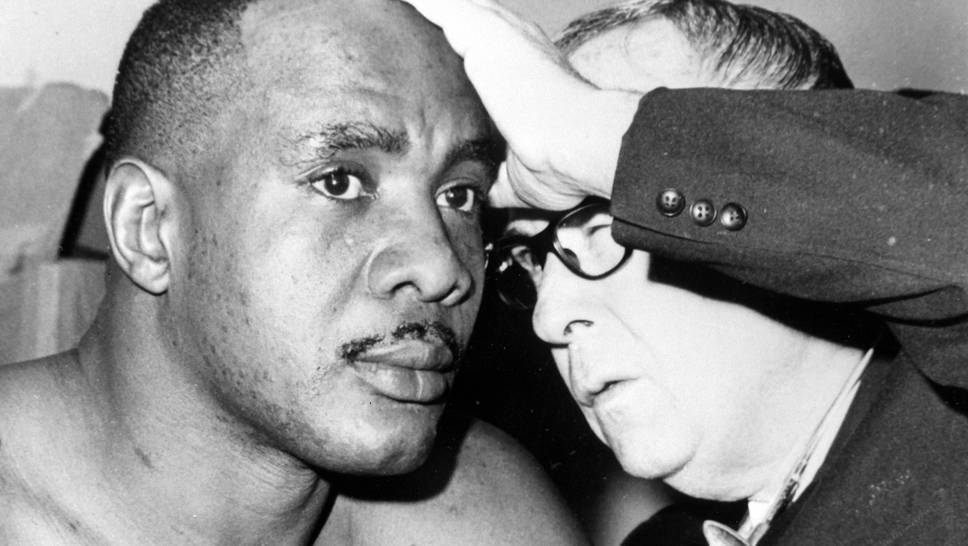Sonny Liston was crowned world champion in 1962 with a historic demolition, and was then in turn duped by the young Muhammad Ali. Today, 54 years ago, the news of his early death shocked the world.
Almost everyone knows his most famous photo, even though he is not the main character in it.
On May 25, 1965, Muhammad Ali surprised former world champion Charles “Sonny” Liston with the legendary “Phantom Punch” and sent him to the ground in 105 seconds.
The photo of Ali, shouting at the downed Liston with the words “Get up, you bum!”, is the quintessential iconic Ali image, one of the most famous shots in sports history.
While Ali’s two victories against the “Black Bear” established his enduring myth, Liston’s personal decline began. On January 5, 1971, the news of his early death shocked the sports world.
Like his later rival Ali, Liston grew up in poor, racist circumstances: Born around 1930, the twelfth of thirteen children of a cotton farmer in Arkansas (the exact date of his birth is unknown), his childhood was marked by a violent father, forced child labor and poor education – Liston never learned to read or write until the end of his life.
From felon to boxing world champion
After the death of his father, his mother moved to St. Louis, where Liston became a criminal: he committed several robberies and thefts and was sentenced to five years in prison.
In prison, his boxing talent was revealed, which paved the way for his early release and his pursuit of the world heavyweight championship.
Liston remained close to the underworld – his manager Frankie Carbo was a well-known mobster – and an attack on a traffic policeman led to him being sent to prison again.
In the ring, however, the “Black Bear” was a phenomenon that achieved the unprecedented: on September 25, 1962, Liston captured the world title with a first-round knockout of Floyd Patterson. Liston also won the rematch before the first bell. No heavyweight champ had ever been dismantled like this before.
Liston vs. Patterson: A charged rivalry
Even before his rivalry with Ali, Liston’s career was also politically charged: because of his criminal history and his perceived unfriendliness, he was widely hated, especially in contrast to Patterson, who was considered a gentleman.
The Patterson-Liston duels were told by many as a story of good versus evil, with racism in the white majority society playing a major role.
The famous author Norman Mailer saw a lot of hypocrisy in the contempt for Liston: he criticized Patterson’s “shabby righteousness” and instead romanticized Liston as a “hero for those who took on fate tackled fate, as long as they had fun doing it; the cigarette smokers, the drunks, the junkies, the potheads, the addicts, the queers, the gays, the switchblades, the gunslingers.”
The great African American novelist James Baldwin also read the contrast between the boxing rivals as a metaphor for the question of “which attitude is more effective in our terrible American dilemma: Patterson’s disciplined kindness or Liston’s outspoken relentlessness”. But Liston was never a national hero in the African American community either because of his tarnished reputation.
Liston mocked and insulted before fights
Liston’s reign was then shorter than generally expected, because no sooner was Patterson beaten than young Cassius Clay raised his head and shocked the world with his sensational victory over Liston.
The 22-year-old Clay had already caused a stir before the first fight on February 25, 1964, by taunting and insulting Liston for weeks. At the weigh-in, Clay appeared in a jacket with the inscription “bear hunting”.
When the bell sounded, Clay provocatively dominated, always dropping his guard, dancing and repeatedly countering the ponderous-looking Liston, until the latter gave up in exasperation after the sixth round. As was later revealed, Liston had prepared poorly, trained little and indulged in escapades with prostitutes.
After losing the rematch against the champion, who had changed his name from Clay to Ali, Liston never got another chance at the world championship. The already unpopular Liston was even more criticized, also because – probably unfounded – rumors of manipulation surrounded the second fight against Ali.
Liston’s death: horrific and still not fully explained today
On June 29, 1970, Liston fought and won his last fight against Chuck Wepner. About six months later, on January 5, 1971, the former world champion was found dead in his Las Vegas apartment.
Liston’s wife Geraldine returned home after a two-week vacation and found a horrific scene: Liston had been dead for several days and was beginning to decompose.
A few weeks before his death, Liston had been in hospital with heart problems and was also said to have been addicted to drugs. A police investigation concluded that Liston had probably died of a heroin overdose on December 30, 1970.
However, the exact circumstances of his death could not be fully clarified, conspiracy theories about a mafia murder flourished, but were never confirmed. Sonny Liston’s epitaph is “A Man” and he is buried in a cemetery in Las Vegas.





